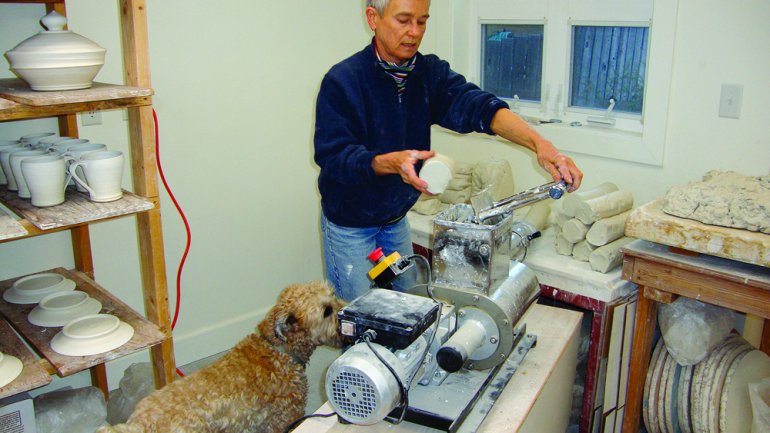Patronage, Big and Small
Patronage, Big and Small
In 2010, Ehren Tool got an unsolicited email, inviting him to apply for a large, no-strings cash prize. At first he was excited. Then he figured it had to be some kind of cruel scam.
“I got angry, thinking it was some crook trying to get money from a broke artist – blood from a stone,” recalls the Berkeley, California-based ceramist. But when he checked out the sender, everything seemed legitimate. In the end, to his astonishment, he got a grant: $50,000 from United States Artists, a nonprofit philanthropic and advocacy organization headquartered in Los Angeles.
“It was a massive boost for the future of my artmaking,” says Tool, who creates cups with images inspired by his service as a Marine during the first Gulf War. The award helped him get on his feet financially and gave him a tremendous emotional lift. “Those moments at two in the morning, when I’m in my studio making my work and wondering if anyone cares about what I’m doing, come less often now.”
If artists at times feel strapped and unappreciated, they’re not imagining things – at least not according to Investing in Creativity, a landmark 2003 study by the Urban Institute that examined life/work issues faced by artists in the wake of the decline in public funding for the arts. The study yielded a curious statistic: While 96 percent of Americans valued art, only 27 percent valued artists. It also identified artists’ pressing needs: housing, work space, affordable health insurance, funding, and validation. To tackle those last two, a coalition of private foundations – Ford, Rockefeller, Prudential, and Rasmuson – stepped up in 2005 with $22 million in seed money, and United States Artists was born.
That’s USA, for short. “It’s a big, generous name, and we’re a big, generous program,” says executive director Katharine DeShaw. Each year, USA gives $50,000 fellowships to 50 individuals in eight disciplines: architecture and design, crafts and traditional arts, dance, literature, media, music, theater, and visual arts. Fellows can do whatever they want with the money, though most put it toward their art. Sarah Jaeger, a potter, paid off her studio mortgage and got a pug mill to work her clay. Furniture/fiber artist Tanya Aguiñiga was able to quit two day jobs and make enough work to support herself for several years.
In December, a new crop of fellows was named. In the crafts/traditional arts category, Sonya Clark (an ACC trustee), Tom Joyce, Beth Lipman, Jon Eric Riis, Akio Takamori, and Aaron Yakim won grants.
USA is campaigning to build a $50 million endowment to permanently fund the fellowships. And with the December 2010 launch of its USA Projects site, it has ventured into the new frontier of micro-philanthropy. Artists who have had any kind of bona fide professional recognition – such as an award, grant, or residency – are eligible to post a project proposal on the site and invite pledges of as little as a dollar.
“It really democratizes our mission,” DeShaw says, adding that USA Projects differs from other crowdsourcing sites in a few key ways. “One, it’s [for] accomplished artists only, a curated experience for the visitor. Two, all gifts are tax-deductible, unlike Kickstarter, which is a for-profit enterprise. And three, we have matching funds” from individual, corporate, and foundation donors.
Kukuli Velarde raised $3,750 to buy a kiln for a community clay studio in Philadelphia. “It was an effort by a lot of people that made it possible,” she says.
For donors, it’s giving made easy. “There’s something fun about just going in, having a project capture your imagination, and making a gift,” DeShaw says. “It’s literally two clicks, you’re on Amazon, it’s done. Isn’t that cool?”
Joyce Lovelace is American Craft’s contributing editor.

